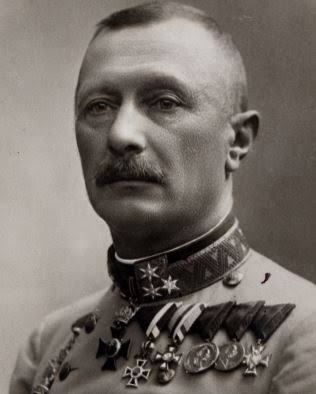Chapter I: Part I
The Year is 1914.
It seems that a warm summer was expected due to the temperature of June 28th. The streets of Sarajevo were alight with splendour as Archduke Franz Ferdinand and his wife Sophie drove in their motorcade through its streets and being greeted by many crowds of cheering people. A few minutes ago a bomb meant for the Archduke went off behind them and injured the people in the following car. After giving his speech at the town hall the Archduke's driver began taking them to the hospital. The driver was about to begin turning right down Schiller Street before being told by the Governor Potiorek that the hospital was left across the Latin Bridge.

Oskar Potiorek, Officer of the Austro-Hungarian Army and Governor of Bosnia Herzegovina from 1911 to 1914.
After the Archdukes visit to the hospital to comfort the victims of the failed attempt on his life. Once this improvised visit was concluded the Archduke, his wife, and the Governor continued with the tour. With the tour the of Sarajevo concluded the Archduke went on to inspect the armed forces of the region. With all the objectives the tour completed the Archduke and his entourage made their way to the Imperial Train and began the journey back to Vienna.
With the Serbian mission to kill the heir apparent to the Austro-Hungarian throne the entire goal of the Serbians was lost. The mission deemed a failure. The King of Serbia Peter I intervened in the new plans being drawn up to assassinate a different member of the Austrian Aristocracy by saying that “Serbia is not prepared for such a struggle that you hope in causing, turn your attention from the ill man of the north to he dying man of the south.” The Chief of Serbian Military Intelligence Colonel Dragutin Dimitrijevic refused to follow other Serbian military officials and continued to pursue his dream of a ‘Greater Serbia’.

Colonel Dragutin Dimitrijevic, Chief of Serbian Military Intelligence
With tensions in Europe so high and Serbian officials plotting treachery against their King’s orders it seems war is on the horizon for Europe. In the Far East the Empire of Japan looks at the German pacific territories with hungry eyes and in Eastern Europe the Russian bear is sickly with an outdated industry and wrought with poverty. What is the future for this world, will the treacherous Serbians enact their plan or will their King discover their plot, it is the writers decision so y’all have to find out.
It seems that a warm summer was expected due to the temperature of June 28th. The streets of Sarajevo were alight with splendour as Archduke Franz Ferdinand and his wife Sophie drove in their motorcade through its streets and being greeted by many crowds of cheering people. A few minutes ago a bomb meant for the Archduke went off behind them and injured the people in the following car. After giving his speech at the town hall the Archduke's driver began taking them to the hospital. The driver was about to begin turning right down Schiller Street before being told by the Governor Potiorek that the hospital was left across the Latin Bridge.
Oskar Potiorek, Officer of the Austro-Hungarian Army and Governor of Bosnia Herzegovina from 1911 to 1914.
After the Archdukes visit to the hospital to comfort the victims of the failed attempt on his life. Once this improvised visit was concluded the Archduke, his wife, and the Governor continued with the tour. With the tour the of Sarajevo concluded the Archduke went on to inspect the armed forces of the region. With all the objectives the tour completed the Archduke and his entourage made their way to the Imperial Train and began the journey back to Vienna.
With the Serbian mission to kill the heir apparent to the Austro-Hungarian throne the entire goal of the Serbians was lost. The mission deemed a failure. The King of Serbia Peter I intervened in the new plans being drawn up to assassinate a different member of the Austrian Aristocracy by saying that “Serbia is not prepared for such a struggle that you hope in causing, turn your attention from the ill man of the north to he dying man of the south.” The Chief of Serbian Military Intelligence Colonel Dragutin Dimitrijevic refused to follow other Serbian military officials and continued to pursue his dream of a ‘Greater Serbia’.
Colonel Dragutin Dimitrijevic, Chief of Serbian Military Intelligence
With tensions in Europe so high and Serbian officials plotting treachery against their King’s orders it seems war is on the horizon for Europe. In the Far East the Empire of Japan looks at the German pacific territories with hungry eyes and in Eastern Europe the Russian bear is sickly with an outdated industry and wrought with poverty. What is the future for this world, will the treacherous Serbians enact their plan or will their King discover their plot, it is the writers decision so y’all have to find out.
Attachments
Last edited:




